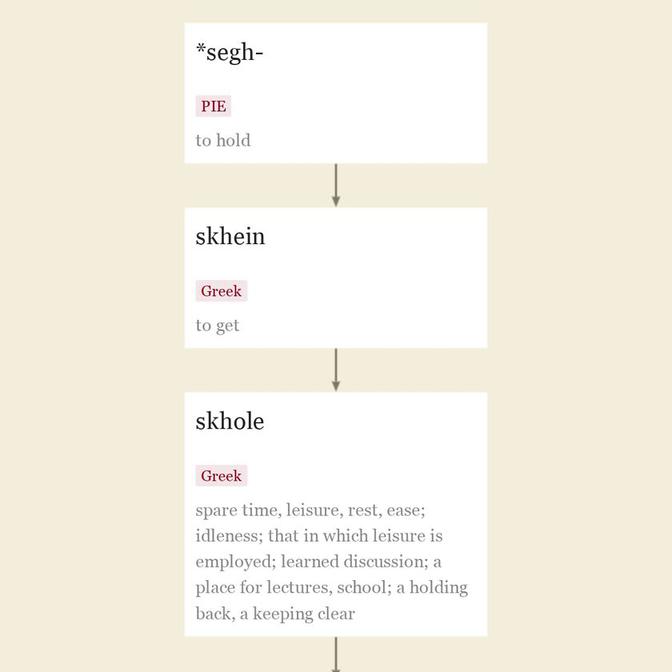Entries linking to schoolgirl
c. 1300, gyrle "child, young person" (of either sex but most frequently of females), of unknown origin. One guess [OED] leans toward an unrecorded Old English *gyrele, from Proto-Germanic *gurwilon-, diminutive of *gurwjoz (apparently also represented by Low German gære "boy, girl," Norwegian dialectal gorre, Swedish dialectal gurre "small child," though the exact relationship, if any, between all these is obscure), from PIE *ghwrgh-, also found in Greek parthenos "virgin." But this involves some objectionable philology. Liberman (2008) writes:
Girl does not go back to any Old English or Old Germanic form. It is part of a large group of Germanic words whose root begins with a g or k and ends in r. The final consonant in girl is a diminutive suffix. The g-r words denote young animals, children, and all kinds of creatures considered immature, worthless, or past their prime.
Another candidate is Old English gierela "garment" (for possible sense evolution in this theory, compare brat). A former folk-etymology derivation from Latin garrulus "chattering, talkative" is now discarded. Like boy, lass, lad it is of more or less obscure origin. "Probably most of them arose as jocular transferred uses of words that had originally different meaning" [OED]. Specific meaning of "female child" is late 14c. Applied to "any young unmarried woman" since mid-15c. Meaning "sweetheart" is from 1640s. Old girl in reference to a woman of any age is recorded from 1826. Girl next door as a type of unflashy attractiveness is recorded by 1953 (the title of a 20th Century Fox film starring June Haver).
Doris [Day] was a big vocalist even before she hit the movies in 1948. There, as the latest movie colony "girl next door," sunny-faced Doris soon became a leading movie attraction as well as the world's top female recording star. "She's the girl next door, all right," said one Hollywood admirer. "Next door to the bank." [Life magazine, Dec. 22, 1958]
Girl Friday "resourceful young woman assistant" is from 1940, a reference to "Robinson Crusoe." Girl Scout is from 1909. For the usual Old English word, see maiden.
[place of instruction] Middle English scole, from Old English scol, "institution for instruction," from Latin schola "meeting place for teachers and students, place of instruction;" also "learned conversation, debate; lecture; disciples of a teacher, body of followers, sect," also in the older Greek sense of "intermission of work, leisure for learning."
This is from Greek skholē "spare time, leisure, rest, ease; idleness; that in which leisure is employed; learned discussion;" also "a place for lectures, school;" originally "a holding back, a keeping clear," from skhein "to get" (from PIE root *segh- "to hold") + -olē by analogy with bolē "a throw," stolē "outfit," etc.
The basic sense of the Greek word is "leisure," which passed to "otiose discussion" (in Athens or Rome, the favorite or proper use of free time), then it came to be used for the place for such discussion.
The Latin word was widely borrowed (in addition to Old French escole, French école, Spanish escuela, Italian scuola; Old High German scuola, German Schule, Swedish skola, Gaelic sgiol, Welsh ysgol, Russian shkola).
The meaning "students attending a school" in English is attested from c. 1300; the sense of "school building" is by 1590s. Sense of "people united by a general similarity of principles and methods" is from 1610s; hence school of thought (by 1848). As an adjective by mid-18c., "pertaining to or relating to a school or to education."
School of hard knocks "rough experience in life" is by 1870; to tell tales out of school "betray damaging secrets" is from 1540s. School-bus is from 1908. School days is from 1590s. School board "local committee of education" is by 1836; school district "division of a town or city for the management of schools" is by 1809.
Trends of schoolgirl
More to Explore
updated on May 09, 2024
Dictionary entries near schoolgirl
scholiast
school
school-book
schoolboy
schooled
schoolgirl
school-house
schooling
schoolmarm
school-master
schoolmate

